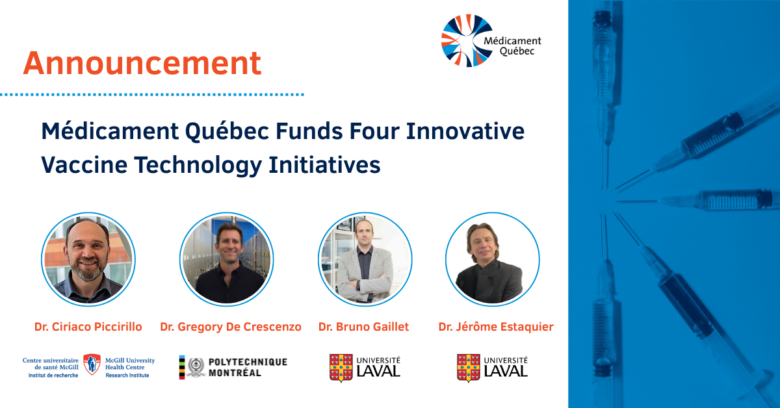Six Projects to Propel Vaccine Innovation in Quebec
As part of its Innovations in Vaccine Technologies program, Médicament Québec is investing $7.5 million to support four groundbreaking initiatives that will strengthen Quebec’s vaccine research and development capacity.
These structuring initiatives, back by the Government of Québec, led in collaboration between academic researchers and industry partners, aim to build sustainable platforms, tools, and practices that will generate tangible benefits for Quebec public. By fostering strong alignment between academic research and the real needs of the ecosystem, these projects will help accelerate innovation and stimulate the development of new vaccines.
The six funded initiatives:
- Dr. Denis Leclerc, Full Professor, Department of Microbiology, Infectious Diseases and Immunology, Université Laval, and Infectious and Immune Diseases Axis, CHU de Québec–Université Laval Research Center
VaxSynergy — Unleashing innovation in vaccine development through a collaborative ecosystem – $1.5M - Dr. Maryam Tabrizian, Full Professor, Department of Biomedical Engineering, McGill University
Establishing a platform to innovate therapeutic vaccines using immunomodulatory nanoparticles derived from bacterial lipids against cancer -$0.8M - Dr. Gregory De Crescenzo – Department of Chemical Engineering, Polytechnique Montréal
Development of a new CHO platform for manufacturing intranasal influenza vaccines – $1.43 M - Dr. Jérôme Estaquier – Department of Microbiology, Infectiology & Immunology, Université Laval
Preclinical tools and services to decode B- and T-cell repertoires induced by immune responses in non-human primates – $0.94 M - Dr. Bruno Gaillet – Department of Chemical Engineering, Université Laval
Lipid nanoparticle platform with active endosomal escape system for mRNA vaccines – $1.5 M - Dr. Ciriaco Piccirillo – Department of Microbiology & Immunology, Research Institute of the McGill University Health Centre (RI-MUHC)
Creation of a Québec human immunology network to support the provincial vaccine ecosystem – $1.5 M
Here are the more detailed descriptions of the funded research activities:

Dr. Denis Leclerc, Full Professor, Department of Microbiology, Infectious Diseases and Immunology, Université Laval, and Infectious and Immune Diseases Axis, CHU de Québec–Université Laval Research Center
Activity: VaxSynergy — Unlocking Innovation in Vaccine Development through a Collaborative Ecosystem
Funding: $1.5M
Despite recent progress in vaccine research and development, particularly highlighted during the pandemic, a critical need remains: an integrated platform to effectively support researchers and small and medium-sized enterprises (SMEs) in the design and development of subunit vaccines and novel adjuvants, from laboratory discovery through to clinical applications.
The VaxSynergy initiative addresses this need by establishing a next-generation bioengineering and biomanufacturing platform that will bring together complementary expertise to create a unique collaborative ecosystem in Québec. This integrated platform will streamline discovery processes, reduce development delays, and accelerate the transition from scientific concepts to clinical proof of concept.
VaxSynergy is distinguished by its portfolio of novel adjuvants and the integration of an essential protein for conjugate vaccines. By combining these components with scalable production methods and artificial intelligence–driven approaches, the platform aims to enhance the efficacy, stability, and speed of vaccine development.
Expected outcomes include:
- Providing researchers and SMEs with access to integrated tools and services for vaccine design and testing;
- Optimizing antigen–adjuvant coupling and exploring alternative delivery methods such as nebulization;
- Generating regulatory-compliant documentation to facilitate clinical translation.
This activity brings together a broad multidisciplinary team:
Academic researchers:
- Denis Leclerc – Université Laval / CHU de Québec
- Steve Bourgault – UQAM
- Laurent Cappadocia – UQAM
- Jean-François Lemay – CNETE
- Philippe Tessier – Université Laval
Industrial and strategic partners:
- Glycovax Pharma Inc. – platform for immunoconjugates and SLA adjuvants
- Courtois Foundation
- Fondation du CHU de Québec
- Strategic Cluster PROTEO
By providing Québec researchers with an integrated, collaborative infrastructure, VaxSynergy will drive vaccine innovation, reduce dependence on foreign technologies, and strengthen Québec’s capacity to respond rapidly to public health needs.
This activity is supported by the Government of Québec through Médicament Québec, which is investing $1.5M. An additional $0.8M is provided by industrial partners, for a total investment of $2.3M.

Dr. Maryam Tabrizian, Full Professor, Department of Biomedical Engineering, McGill University
Activity: Establishing a platform to innovate therapeutic vaccines using immunomodulatory nanoparticles derived from bacterial lipids against cancer
Funding: $0.8M
Metastatic cancer, responsible for nearly 90% of cancer-related deaths worldwide, remains a major medical challenge. Its complexity stems from the genetic heterogeneity of tumors, the ability of cancer cells to evade the immune system, and their high adaptability. Conventional treatments such as surgery, radiotherapy, or chemotherapy offer limited solutions against metastatic mechanisms, often leading to recurrence and poor prognosis.
In light of these limitations, therapeutic vaccines are emerging as a promising approach by mobilizing the immune system to directly target cancer cells. However, several obstacles remain, including the identification of relevant tumor antigens and the development of effective delivery systems.
Prof. Tabrizian’s activity aims to develop an innovative platform using hybrid lipid nanoparticles (hLNPs) derived from bacteria to design new RNA-based cancer vaccines. These hLNPs combine bacterial lipids with synthetic lipids, providing greater biocompatibility, stability, and RNA delivery efficiency than conventional nanoparticles. They can also be produced at scale using genetically engineered bacteria, thereby reducing manufacturing costs and enabling high-throughput screening.
To achieve this, the activity will integrate multiple platforms for the design, characterization, evaluation, and validation of hLNPs, including:
- AI- and machine learning–assisted design tools to optimize formulations, identify trends in data, reduce trial-and-error processes, and predict hLNP performance.
- In vitro, in vivo, and organ-on-chip analyses to validate stability, efficacy, and immune system activation.
- High-throughput screening to accelerate identification of the most promising formulations.
- Bioinformatics tools coupled with machine learning to refine candidate selection.
This integrated multi-platform approach will accelerate the identification of the most promising RNA vaccines and facilitate their progression toward clinical trials.
This project brings together a large multidisciplinary team:
Academic researchers:
- Maryam Tabrizian – Full Professor, Biomedical Engineering, McGill University
- Julia Valdemarin Burnier – Assistant Professor, McGill University
- Guojun Chen – Assistant Professor, Biomedical Engineering, McGill University
- Thomas Duchaine – Full Professor, Biochemistry, Goodman Cancer Institute, McGill University, and Scientific Director of the mRNA Therapeutics Platform
- Paul François – Full Professor, Biochemistry and Molecular Medicine, Université de Montréal, IVADO & Mila
- Marc Lavertu – Associate Professor, Chemical Engineering, Polytechnique Montréal
- Sara Mahshid – Assistant Professor, Biomedical Engineering, McGill University
- Ian Watson – Associate Professor, Biochemistry, McGill University
Industry partners:
- Nanofacile, a company specializing in nanofabrication and development of innovative materials
- RNA Technologies & Therapeutics (RNA T&T), an expert company in the design and optimization of RNA-based technologies
- Beeta Biomed, a company focused on developing biotechnology solutions for health applications
By combining cutting-edge approaches in bioengineering, artificial intelligence, and immunology, this activity has the potential to transform the research and development of therapeutic cancer vaccines and position Québec among the world leaders in this emerging field.
This activity is supported by the Government of Québec through Médicament Québec, which is investing $0.8M. This contribution is supplemented by $0.4M from industrial partners, for a total investment of $1.1M.

Dr. Gregory De Crescenzo – Department of Chemical Engineering, Polytechnique Montréal
Development of a New CHO Platform for the Manufacturing of Intranasal Influenza Vaccines – Funding: $1.43M
Influenza continues to pose a persistent burden on Québec’s public health system. Seasonal flu vaccines require recurring, costly boosters, demanding large-scale vaccine production and a complex supply chain.
Current vaccine production techniques have notable limitations, leaving room for improvement to better meet public health needs. For example, avian influenza H5N1, now emerging as a new pandemic threat, could overwhelm traditional egg-based vaccine manufacturing capacity. Meanwhile, mRNA vaccines remain risky, suboptimal, and expensive due to their dependence on a strict cold chain.
This research initiative aims to develop a bioreactor-based vaccine production platform using stable pools of CHO cells rather than traditional stable cell lines. This approach significantly reduces the production time of batches intended for in vivo preclinical testing and holds strong potential to counter an eventual H5N1 pandemic. In addition, lyophilized intranasal formulations will be developed to eliminate cold-chain requirements while offering a more patient-friendly route of administration.
The resulting portfolio of technology platforms will be directly transferable to industry and enable the cost-effective bioreactor-based production of antigen influenza vaccines.
This research initiative is supported by a multidisciplinary team including:
- Dr. De Crescenzo from Polytechnique Montréal (Drs. De Crescenzo, Henry, and Guo)
- Researchers from the National Research Council of Canada (Drs. Durocher, El Bakkouri, and Tran)
- Industrial partner Biodextris, specializing in vaccine and therapeutic product manufacturing
- Industrial partner Inspirevax, focusing on adjuvant development to address challenges related to intranasal administration
This project is supported by the Government of Quebec through Médicament Québec, which is investing $1.4 million. An additional $0.7 million from industry partners brings the total investment to $2.1 million.

Dr. Jérôme Estaquier – Department of Microbiology, Infectious Diseases & Immunology, Université Laval
Preclinical Tools and Services to Decode B- and T-Cell Repertoires Induced by Immune Responses in Non-Human Primates (NHPs) – Funding: $0.94M
Due to their strong similarity to humans, non-human primates (NHPs) are essential for advancing our understanding of infectious diseases and developing and testing new vaccines and treatments. Interactions between T and B cells within lymphoid organs are critical to generating long-lived memory cells and producing antibodies that can control microbial infections. Gaining deeper insight into these interactions is key to understanding the dynamics of these immune cells, which form the body’s primary defense against pathogens.
Dr. Estaquier’s team will develop a tool to characterize lymphocyte populations at the single-cell level in order to decipher and monitor T- and B-cell immune responses in NHPs, using single-cell gene analysis approaches.
This multidisciplinary research activity will involve:
- A specialist in high-throughput sequencing and artificial intelligence
- A specialist in infectious disease immunology
- BD (Becton Dickinson), supporting infectious disease research through advanced equipment acquired during prior vaccine development programs
This new tool will be integrated into the development of a national infrastructure funded by the Canada Biomedical Research Fund (CBRF) and the Biosciences Research Infrastructure Fund (BRIF). By leveraging a structure dedicated to the development of innovative vaccines and therapeutic approaches, this toolkit will provide critical support to Canada’s industrial ecosystem and expand the range of available services.
This project is supported by the Government of Quebec through Médicament Québec, which is investing $0,9 million. An additional $0.4 million from industry partners brings the total investment to $1.1 million.

Dr. Bruno Gaillet – Department of Chemical Engineering, Université Laval
Lipid Nanoparticle Platform with Active Endosomal Escape System for mRNA Vaccines – Funding: $1.5M
Lipid nanoparticles (LNPs) played a critical role in the rapid development of mRNA vaccines against COVID-19, protecting and delivering messenger RNA into cells. However, a large portion of this mRNA remains trapped inside the cell without producing the intended effect, and only a small fraction successfully reaches its target. Improving this process is essential to making vaccines more effective, reducing required doses, and minimizing side effects.
To enhance mRNA internalization, Dr. Gaillet’s team will engineer an endosomal escape system within LNPs, creating a breakthrough platform capable of drastically increasing the percentage of mRNA delivered into the cytoplasm of cells.
Several partners will be involved in the project:
- Researchers from Université Laval
- Feldan Therapeutics, which will oversee development and secure the funding required for platform deployment—generating a multiplier effect for financing new vaccine technologies in Québec
- TransBIOTech, the College Centre for Technology Transfer, which will evaluate the platform’s activity in the appropriate animal model
In addition to advancing a platform that improves the effectiveness of mRNA vaccines, this initiative will foster the creation of a network of highly qualified personnel in R&D, manufacturing, and commercialization of mRNA vaccines in Québec.
This project is supported by the Government of Quebec through Médicament Québec, which is investing $1.5 million. An additional $1 million from industry partners brings the total investment to $2.5 million.

Dr. Ciriaco Piccirillo – Department of Microbiology & Immunology, Research Institute of the McGill University Health Centre (RI-MUHC)
Creation of a Québec Human Immunology Network to Support the Provincial Vaccine Ecosystem – Funding: $1.5M
While preclinical studies are valuable, they provide only limited insights into the efficacy and safety of vaccines under development. Advanced human immunology platforms offer a more powerful alternative for vaccine discovery and characterization, providing the industry with an essential advantage.
Dr. Piccirillo’s team will develop an advanced human immunology platform designed to generate crucial information for vaccine development—such as a better understanding of mechanisms of action, as well as data to reduce risk and fully characterize vaccine candidates. This platform will help scientists and companies developing new vaccines to better assess their products and the immune responses they trigger.
The platform will function as a comprehensive toolkit, including:
- A human tonsil organoid model
- A super-resolution microscopy technique
- Multi-institutional teams developing assays to evaluate B- and T-cell responses
- Artificial intelligence tools generating comprehensive profiles of vaccine-induced responses
This research activity will involve collaborators actively contributing to tool development:
- CellCarta, strengthening T-cell phenotyping efforts
- Aramis Biotechnologies, providing vaccines and human volunteer samples for proof-of-concept studies.
This project is supported by the Government of Quebec through Médicament Québec, which is investing $1.5 million. An additional $1.2 million from industry partners brings the total investment to $2.7 million.


Comments are closed.